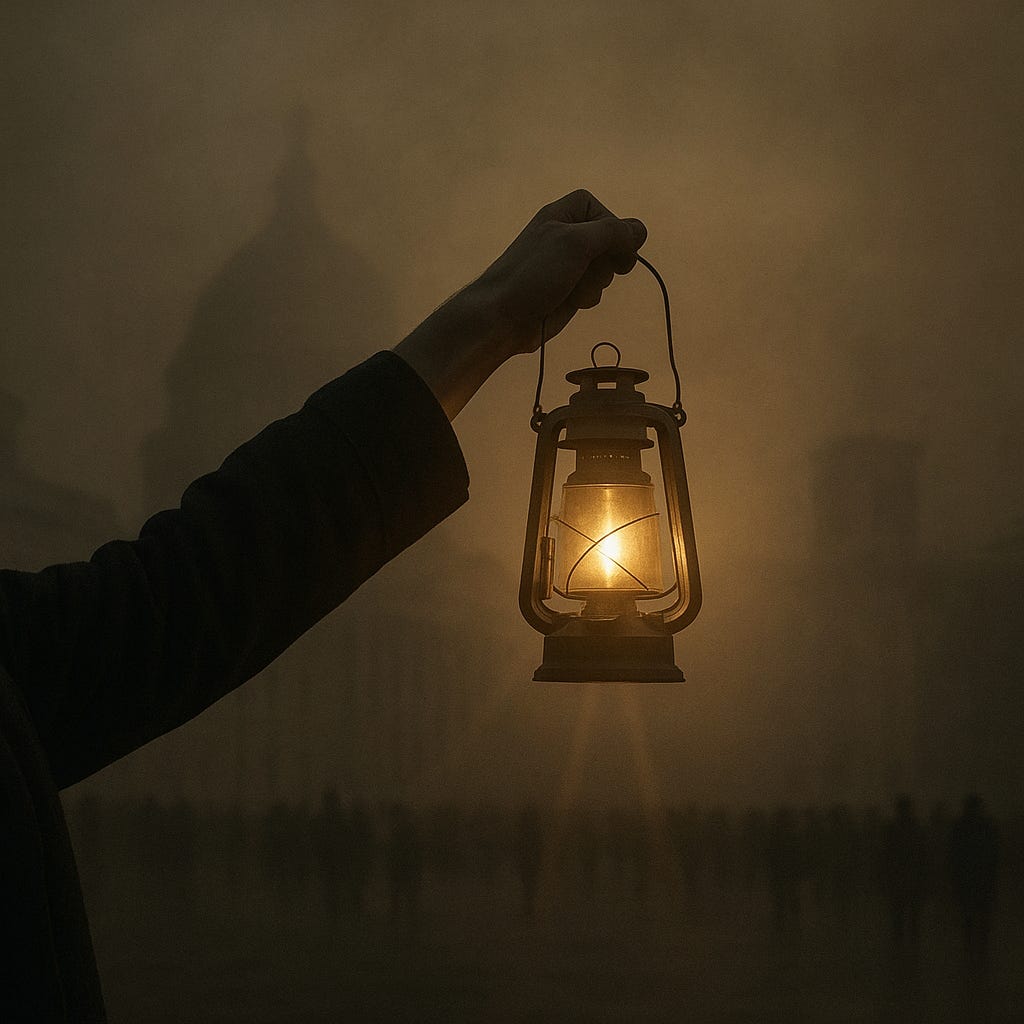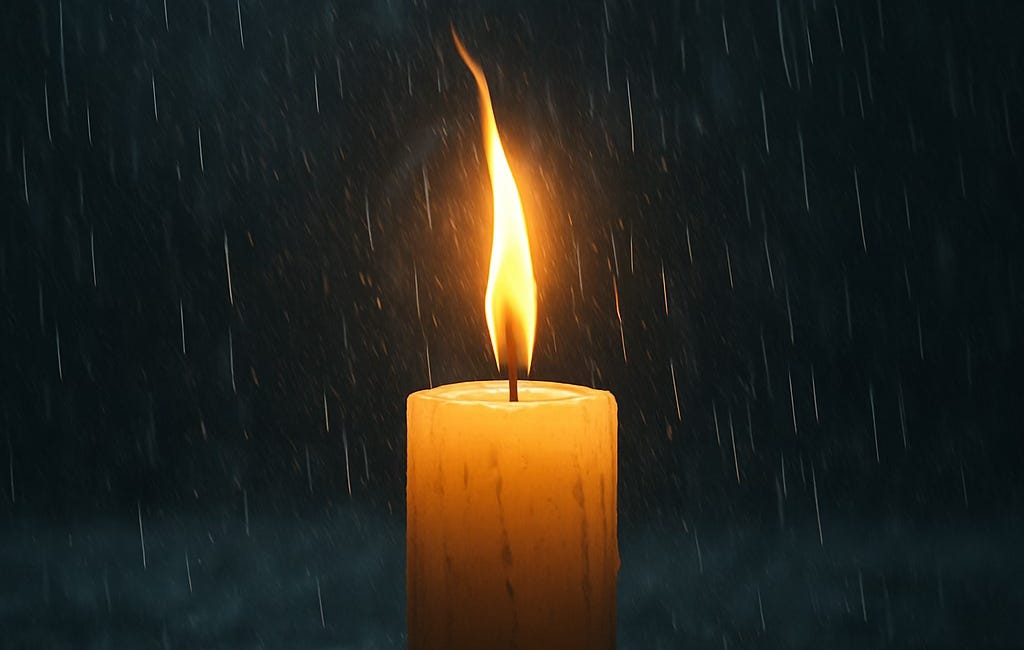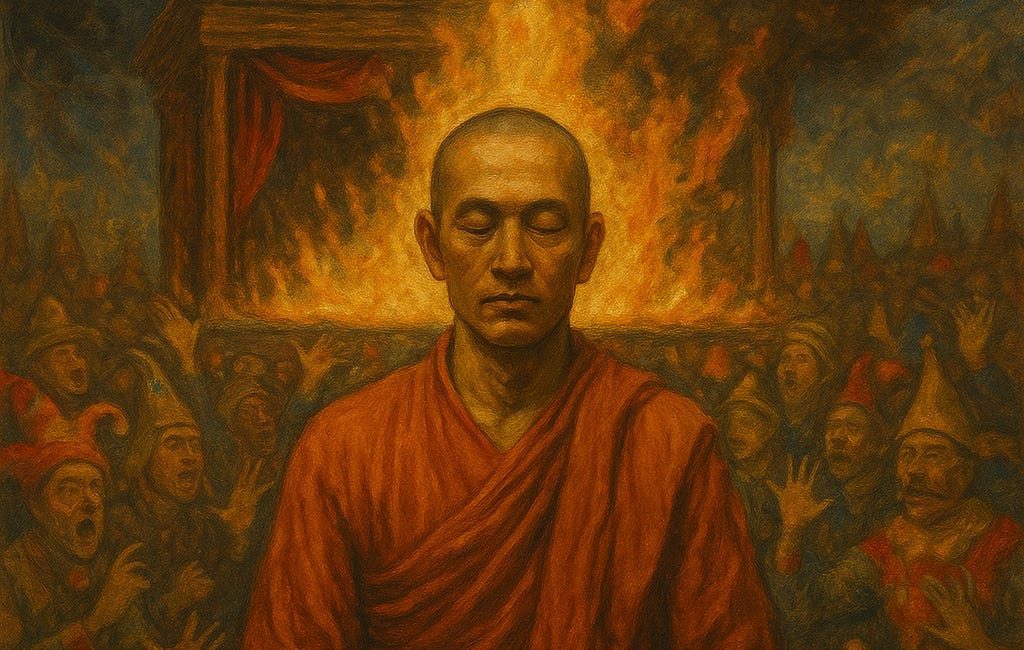Learning to Breathe Through the Smog
Cultivating Mental Clarity When Public Discourse Is Poisoned by Lies
“The people never believe anything until it is officially denied.” — Otto von Bismarck
The Smog in Our Minds
Step outside on a morning when the air is thick with pollution and you know the feeling immediately. Your eyes sting, your chest tightens, you draw breath only to cough. That’s what it feels like to live right now in the middle of our poisoned public discourse. Lies hang in the atmosphere, heavy and invisible, seeping into every pore of civic life. We try to speak, and the air tastes acrid. We try to see, and the view is blurred by manufactured smog.
I’ve had mornings where I scrolled the headlines and felt the same choking sensation. Not because I didn’t know what was true, but because the sheer volume of distortions, misdirections, and outright fabrications made truth feel distant, almost unreachable. It’s not just that we’re being lied to—it’s that the very act of lying has become so normalized that it feels like oxygen itself is under assault.
When the air is thick with smog, you don’t blame yourself for coughing. You don’t say, “Maybe it’s my lungs that are wrong.” You understand the environment is toxic. And yet when the discourse is poisoned, we so often doubt ourselves. Maybe I’m the one who’s confused. Maybe the shouting crowd is right. That’s how lies work—not by simply substituting falsehood for fact, but by corroding our capacity to trust what we already know.
The Nature of the Smog
Lies are not random. They are not accidents. They are instruments of power.
History is littered with proof. Goebbels didn’t flood the air with propaganda just to entertain himself—he did it to disorient a people until they were pliable, until they would swallow anything. Soviet citizens often spoke of living with “two truths”: the official one they recited at work or in school, and the private one they whispered at the kitchen table. McCarthy’s witch hunts thrived not on evidence but on the poisonous fog of suspicion, accusation, and deliberate distortion. Families were broken not because guilt was proven, but because fear made accusation indistinguishable from fact.
In our own time, the tactics are no less deliberate. Entire media empires exist to spin confusion, to stoke grievance, to repeat falsehoods so relentlessly that repetition itself becomes mistaken for proof. A leader tweets a lie, it’s amplified by a hundred outlets, and before the day is done the fog is so thick that people throw up their hands: “Who can say what’s true anymore?” That surrender—that exhaustion—is the goal.
And technology supercharges it. Algorithms don’t care if the content is true; they care if it’s sticky. They pump outrage and deception through veins already swollen with distrust. The result isn’t just a few false statements floating around—it’s a pervasive cloud cover that settles into our lungs, our speech, our thought.
The genius of modern lying isn’t persuasion.
It’s suffocation.
Why Clarity Matters
When the air is clear, action is possible. You can see the road, you can choose your path. But when fog covers everything, paralysis sets in.
That’s the civic danger of lies. They don’t just twist facts.
They choke futures.
It’s not only that people come to believe falsehoods, though that’s bad enough. It’s that millions more retreat into cynicism. If everyone is lying, why try? If nothing is true, why act? Democracy cannot survive that kind of suffocation. It requires citizens who believe not only in their own agency but in the possibility of shared reality.
I spent decades in government service, and I saw firsthand how clarity can be the difference between life and death. In the military, a garbled order could mean catastrophe. In law enforcement, misreporting a fact could send the wrong person to prison. Accuracy wasn’t decoration—it was survival. Now I watch leaders lie with a smirk, as though deception were just part of the show. And I can feel the oxygen thinning.
Trust corrodes first in institutions. Then in neighbors. Then in ourselves. And once self-trust collapses, the game is over. A society that doubts its own eyes is one that will accept anything.
Moral clarity, then, isn’t a luxury. It’s oxygen. It’s the thing that lets us survive long enough to resist, long enough to imagine something better.
Learning to Breathe
So how do we breathe when the air is poisoned? I’ve had to teach myself a few practices, not because I’m wise but because I’ve felt the suffocation. Maybe they’ll help you, too.
Slow the Breath
The first instinct in smog is to gasp, to choke, to panic. But clarity requires stillness. I’ve learned to pause. To shut down the firehose of noise, even for a few minutes, and simply sit with myself.
I think of one evening when I was glued to the television, trying to keep up with a political scandal unraveling by the hour. By midnight my head throbbed, my chest ached. I finally switched it off, sat in the dark, and just listened to my breath. It wasn’t mystical; it was human. For the first time that day, I wasn’t drowning in the noise.
Baldwin reminds me that clarity doesn’t come from frantic searching but from daring to see what’s already in front of us. “Not everything that is faced can be changed,” he wrote, “but nothing can be changed until it is faced.” The discipline of facing is its own form of breathing.
Filter the Air
You wouldn’t walk outside in Beijing on a Code Red pollution day without a mask. Why do we treat our minds as less precious than our lungs? I’ve had to become ruthless about what I let in.
I used to flip from one channel to the next, like someone darting between burning buildings, hoping one might be safe. But it never was. Twenty outlets screaming only made the fire louder. Now I hold to two or three sources I trust—slow, steady voices that don’t confuse volume for truth. It’s not perfect air, but it’s breathable.
Filtration isn’t withdrawal. It’s survival. Choosing depth over noise is an act of resistance.
Name the Smog
One of the dirtiest tricks of this age is the euphemism. Lies become “alternative facts.” Propaganda becomes “spin.” Outright corruption becomes “partisan gamesmanship.” No. We have to call it what it is. A lie is a lie. Corruption is corruption.
I remember being in a meeting years ago where a senior official tried to soften the word “failure” into “a temporary lapse.” Everyone chuckled nervously. I didn’t. I said, “No, this was a failure. Call it what it is.” It wasn’t comfortable, but clarity rarely is.
When I refuse to use their softened language, I feel my lungs clear just a little. Words matter. The truth is polluted enough without me helping disguise the fumes.
Find Fresh Air in Community
Breathing isn’t a solitary act. It happens in concert with others. That’s true civically, and it’s true personally.
When the fog is thickest, I’ve found relief in conversation with friends who are searching for truth in good faith. It’s not that we always agree. But we agree on the premise that reality exists. That words should correspond to things. That truth matters.
Books can be community, too. A poem by Rilke, an essay by Arendt, a letter from Baldwin—they remind me that I am not alone in the fog. Others have coughed through this air before, and they survived long enough to leave me their breath.
I think often of Whitman, who urged us to “breathe the open air, wafted by day-light.” He meant it literally and metaphorically. Fresh air is both atmosphere and spirit, and it is found together or not at all.
What Happens If We Don’t Learn to Breathe
Here’s the blunt truth: people who don’t learn to breathe in smog don’t last. They give up. They harden or they collapse.
On the psychological level, the cost is despair. You’ve met them—people so beaten down by lies that they no longer believe in anything. Cynicism masquerades as sophistication, but it’s really surrender.
On the civic level, the cost is apathy. A nation that doubts its own senses won’t resist tyranny. It will shrug. And tyrants thrive on shrugs.
On the moral level, the cost is complicity. Silence becomes the lie’s best ally. Fatigue becomes collaboration. We didn’t choose it, but we breathe it all the same.
I know this because I’ve felt the temptation myself. There were days during my government career when I wanted to stop fighting over words, to let the euphemisms slide, to accept the fog. But I also knew that once you stop naming reality, you lose it. And once you lose it, you never get it back.
A Call to Breathe Together
So here’s my plea: breathe with me. Don’t let the smog trick you into thinking oxygen is gone. It’s still here, waiting in the small acts of clarity we practice each day.
When you slow down long enough to listen to yourself—that’s a breath.
When you refuse to share a lie, even a clever one—that’s a breath.
When you choose one trustworthy source instead of twenty screaming ones—that’s a breath.
When you sit with a friend and talk honestly about what you see—that’s a breath.
And every breath adds up. Every breath is rebellion against the smog.
The smog won’t last forever. Lies never do. They burn bright and are suffocating, but they cannot sustain themselves indefinitely. History shows us that. What matters is whether we keep breathing long enough to see the sky clear.
I’ve lived long enough to watch regimes rise and fall, to see the air darken and lighten again. What I know is this: clarity isn’t handed to us. We cultivate it, one breath at a time, even when the air tastes foul. Especially then.
And perhaps more than keeping ourselves alive, we can become clean air for others. Every honest word spoken aloud is oxygen in a room. Every truth we cling to together is a window cracked open. Every refusal to bow to the smog is a breath we offer to the people around us.
Closing
To breathe through the smog is to insist that truth still matters. To practice clarity is to keep your humanity intact when others are selling theirs for cheap applause.
The lies are thick right now. They sting the eyes and burn the lungs. But we are not powerless. We still have the choice to breathe—slowly, deliberately, defiantly.
And in the end, that choice is everything.
Support This Work
Why I Opened the Gates
I don’t believe the words I write should be gated. They aren’t a luxury item or a product for the highest bidder. They’re meant for all of us—especially in a time like this, when democracy, spirit, and truth are tested every day.
That’s why every essay, every archive, every reflection is free to read. No paywall. No tiers of access. Just words given openly, because I believe they’re meant to travel farther than my reach.
Why I Still Ask
But writing isn’t weightless. It takes time, energy, tools, and no small measure of fire to keep it alive. If you’ve found meaning here—if these words have given you clarity, courage, or a little light—then I ask you to consider helping me sustain it.
This is not a transaction. It’s participation. A way of saying: this matters, keep going.







This is SO spot on that I find myself tearing up as I read it. Even my chest tightened knowing that this is EXACTLY how I feel more and more on a daily basis. I cannot thank you enough for putting into words what all of this mumbo-jumbo does to my psyche, my body, and my heart! I am now going to go back to my "summer reading" so I, too, can listen to my breath! 💙
The whole issue in my opinion is that this administration controls the narrative by putting outrageous subjects out so that people, in their perfectly normal human reactions, REPEAT the lies, the trivial memes or videos .... no wonder we are suffocating
Maybe we should stop talking about the crazy things this president or his administration is doing.
We give them a FREE MEGAPHONE!! Don't we ?
I bet that a lot of people would love to talk about things that pertains to THEM ... finding solutions about fixing prices, medical coverage, daycare, housing, and dreams for a better place/ society/ World where they can thrive and live their Life to the fullest!
just saying ....